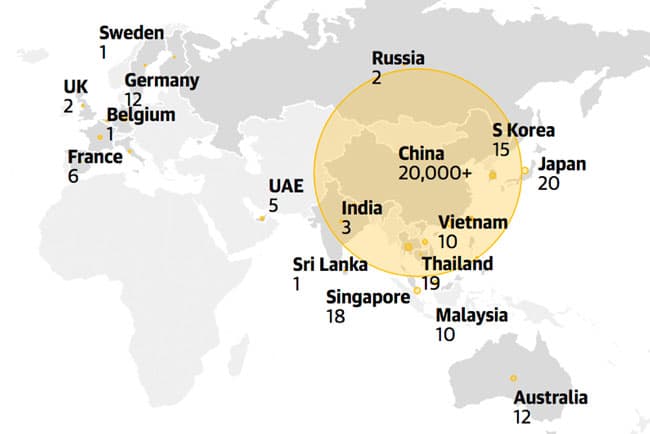Coronavirus update: Schools and universities brace for impact amid global response
By the end of last week, the World Health Organisation (WHO) had categorised the coronavirus as a global health emergency – not yet a pandemic – and with concern rising across the globe, many governments are now sealing their borders to foreigners travelling from China. The following is a partial list of countries that have done so (as of 5 February) in an attempt to prevent the transmission of the virus:
- United States
- Australia
- New Zealand
- Vietnam
- Japan
- Russia (with some exceptions)
- Hong Kong (not 100% but most border crossings are now closed)
- Pakistan
- Italy
- Taiwan
- North Korea
- Singapore
- Mongolia
Additionally, there are many more countries that have temporarily suspended flights in and out of China and established quarantine restrictions for new arrivals from China. Some governments are sending in airplanes specifically to remove their citizens from the most affected regions of China, especially Hubei province. The city of Wuhan remains the epicentre of the virus, and the overwhelming majority of cases and deaths have been reported there.
As of 5 February, the Guardian reports that the death toll from the coronavirus is nearing 500, with more than 24,500 people infected globally.
There are dozens of countries with both cases of and deaths from the virus, as this Guardian map illustrates.

Australian institutions may be particularly hard hit
In Australia, where universities are highly reliant on Chinese enrolments, educators are scrambling to quickly come up with strategies to both safeguard students on campus as well as help Chinese students who have been offered spaces in programmes to defer their start dates.
Many are putting together plans to extend their distance and online education services, not only for future students but also for current students who are stuck in China after having returned to their country for Lunar New Year celebrations. But Chinese authorities are highly selective about which foreign platforms and services they allow into the country, which may compromise the effective delivery of online education in China.
Universities Australia Chief Executive Catriona Jackson said that “universities would adhere ‘meticulously’ to the advice of health and immigration authorities while managing the impact for students, emphasising that,
“Our focus is on safeguarding the health and safety of everyone in university communities, and minimising any disruption to study, exams, and assessment.”
Times Higher Education has also pointed out that Australia may be particularly hard hit by the travel effects of the virus:
“Unlike northern hemisphere institutions, Australian universities break for around three months at the end of the year. Many foreign students return home for Chinese New Year celebrations, with the intention of returning to Australia to resume their studies around the beginning of March, when most local universities’ semesters commence.”
“Almost two-thirds of Australian universities’ Chinese students are currently abroad,” reports THE, “an indication of the scale of the financial hit confronting the sector if the coronavirus crisis persists.” These students will now face a wait of up to two weeks before being allowed to re-enter Australia.
Despite the seriousness of the potential impact for Australian universities, Education minister Dan Tehan urged for calm.
“What we’ve seen from SARS [severe acute respiratory syndrome] was that the bounce back in the international education sector was quick and immediate. Things have changed since SARS, but that is the information that we can go on historically.”
International Education Association of Australia Chief Executive Phil Honeywood adds that schools, even more than universities, stand to be highly impacted by the coronavirus-based travel restrictions:
“Independent schools and a number of government schools rely heavily on the Chinese student cohort to make up the numbers they have allocated for the year ahead.”
Chinese students make up almost half of international enrolments in the Australian school sector, and even before the coronavirus, educators in this sector were dealing with an 11% decline from the Chinese market from August 2018 to August 2019.
Take extra steps to reassure and support Chinese students
In the US, English USA has been sharing guidance from the American International Recruitment Council (AIRC) on best practices in dealing with the virus and its social and economic effects. The first recommendation is to send a “message of solidarity to your Chinese partners and stakeholders.” It’s good advice, since like SARS before it, the coronavirus will eventually be controlled (scientists are currently racing to develop a vaccine, though this may not be in time for the current outbreak). What will linger after the outbreak is over is the extent to which educators, and countries in general, treated their Chinese students, partners, and travellers with respect and care. The guidance adds that,
“The [coronavirus] symptoms are flu-like and the virus has affected less than 0.0007% of the Chinese population. The coronavirus should not be cause for generalised fear on campus. Chinese students should be accorded the same dignity and respect that all students deserve on your campus.”
The following video produced by Canadian broadcaster CBC offers helpful information about the illness and how people can protect themselves from it and help to stop the spread:
Source: CBC News
Pause on recruitment
The AIRC guidance also advises educators to hold off on recruiting in China in February, and possibly later, noting that, "Most schools and universities will be closed. Few companies will be operating at full capacity, and inter-city transportation is expected to be significantly more complicated until 7 February." The guidance adds:
“Unless your institution requires otherwise, adopt a ‘wait and see’ approach for March, April, and May travel. [We] believe that the situation will continue to worsen for some days or weeks, but eventually the virus will be contained in a similar way to how SARS was contained in 2003–2004. Expect that schools will reopen in late February or early March. Before then, arranging travel, visits, or fairs will be next to impossible because officials will be hesitant to approve them, if they’re in the office at all...Many event planners are cancelling or postponing March events, while others are awaiting more information. If you plan to travel to China in March, [AIRC] suggests waiting a week from now to get a greater sense of finality about whether the events will be taking place. April events may be affected, but we would suggest waiting as late as you comfortably can before cancelling or adjusting your plans. May events are less likely to be significantly affected, although they may be more limited in scope and participation.”
In the meantime, [AIRC] suggests “hosting a webcast or using forms of digital engagement in place of February and possibly March travel.”
International students in China
China is not only a major sending country but also an increasingly popular study abroad destination. There were close to 500,000 foreign students studying in China in 2018, including large cohorts from South Korea (50,600 students in 2018), Thailand (28,600), Pakistan (28,000), India (23,200), and the US (21,000 students).
The atmosphere is tense for those students who have not left, especially in Wuhan. For example, Pakistan's State Minister of Health Zafar Mirza said on Wednesday that “four of an estimated 500 Pakistani students in the city have already been confirmed to have the virus.” Many other international students are panicking; misinformation abounds.
"You can understand people are kind of paranoid," said Bangladeshi student Mohammad Samiul Ahsan to Al Jazeera. Mr Ahsan is also the Wuhan University International Students' Union vice president.
“I wear a mask all the time,” Redwan Mohamed Nur, one of 14 Somalian students at Wuhan University told Voice of America. Mr Nur is one of thousands of Africans studying in China.
Students from Indonesia, Bangladesh, Myanmar, Cambodia, and Tanzania also spoke with VOA about their fears and the limited food stores they have access to as Wuhan continues to be under lockdown.
Keep calm
As always with epidemics, public panic is one of the most dangerous contributors to the scale of the virus' impact. Offering students extra supports such as counselling and coronavirus-specific information centres and resources are all excellent steps for helping students, family members, and staff to weather the current outbreak.
For additional background, please see:













